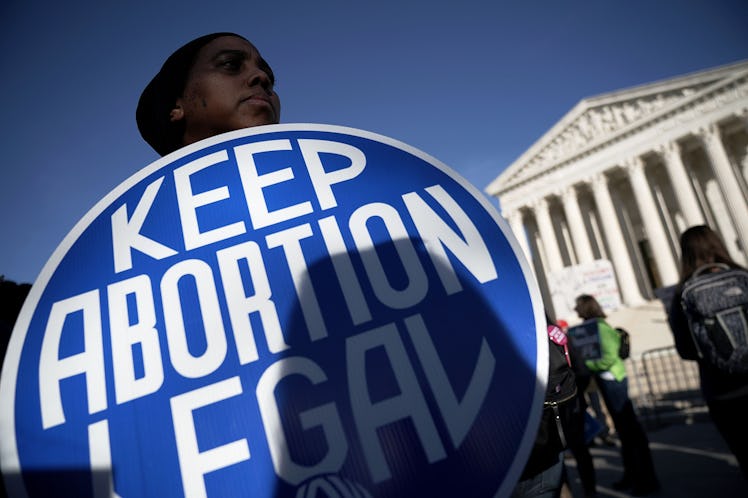
Illinois Is Working To Expand Abortion Rights, So That's A Change
Chances are, you've probably heard about the flurry of new limits on abortion being promoted in state legislatures around the country. In the past few weeks alone, several states such as Alabama, Georgia, and Missouri have introduced laws that ban all or most abortions, sometimes even in cases of rape or incest. But not every state is among the wave. For example, Illinois' new abortion bill loosens restrictions on the procedure. So, that's definitely a change in direction.
On Sunday, May 26, CBS' Chicago affiliate reported that the Illinois General Assembly voted to pass the Reproductive Health Act, which has been described as the "most liberal reproductive health care measure" in the United States. The bill would reportedly repeal the state's Partial Birth Abortion Ban Act, which banned abortions after 20 weeks, and would require insurance companies to cover abortions and other related services. The Reproductive Health Act would also, according to The Chicago Sun-Times, secure reproductive health as a "fundamental right" and create a legal path for a person who believed the state had violated their right to make their own reproductive choices to sue.
“This Act sets forth the fundamental rights of individuals to make autonomous decisions about one’s own reproductive health, including the fundamental right to use or refuse reproductive health care,” the legislation, now referred to as Senate Bill 25, says. The bill would also restrict “the ability of the State to deny, interfere with, or discriminate against these fundamental rights.”
The measure passed by a 12-7 vote, with no Republican support, per The Chicago Sun-Times. It will now head to the full Illinois House for a vote, according to ABC's Chicago affiliate. The Sun-Times noted that it is "unclear" whether the bill will have enough Democratic support in the House to pass, but if it does pass through the House, as well as the Senate, it seems likely that Democratic Gov. J.B. Pritzker will sign it into law. A spokesperson for the governor told the Sun-Times “the governor is a lifelong advocate for a woman’s right to choose,” particularly in light of the “recent attacks on access to reproductive health care across the country.”
What a change in pace from all the anti-abortion legislation that has surfaced as of late. More than a handful of states have passed bills that limit or effectively ban abortion — a push that is said to be an effort to get the abortion debate back to the Supreme Court, which now has a conservative majority. The reported hope is that the highest court will overturn Roe v. Wade, the 1973 landmark decision establishing abortion rights. Alabama's Lt. Gov. Will Ainsworth made it clear that overturning Roe is his state's goal in a statement shared on May 9, which said in part:
It's important that we pass this statewide abortion ban legislation and begin a long overdue effort to directly challenge Roe v. Wade. ... Now that President Donald Trump has supercharged the effort to remake the federal court system by appointing conservative jurists who will strictly interpret the Constitution, I feel confident that the U.S. Supreme Court will overturn Roe and finally correct its 46-year-old mistake.
But Illinois isn't the only state that has made a move to secure abortion rights. On May 21, the Nevada state Assembly also voted to remove abortion restrictions. The measure, called SB197, removes a requirement that abortion providers tell patients about the “physical and emotional implications” of an abortion, or determine a person's age and marital status before performing the procedure. It also decriminalizes giving a person medication to induce an abortion without a doctor's advice. Similarly, the bill received unanimous Republican disapproval. But it still may pass. The Nevada State Senate has already passed similar measures, and Nevada Gov. Steve Sisolak, who will have to sign the bill into law if it passes through the Senate, has spoken in favor of abortion rights. Other states, such as New York and Virginia, have also made moves to ease restrictions on abortion, with New York decriminalizing abortion and Virginia moving to simplify the process to access it. New York's bill was signed into law by Gov. Andrew Cuomo on Jan. 22, while Virginia's bill was tabled on Jan. 30.
There's no doubt that anti-abortion legislation will continue to pop up around the country, but it looks like several states are taking the same amount of steps to maintain abortion rights. Keep your eye out for what happens next.